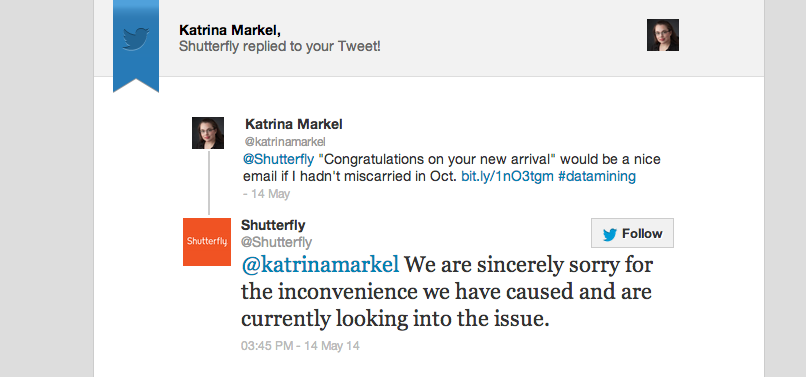As regular readers of L&P know, I suffered a miscarriage in the fall. I didn’t mention my pregnancy on social media until a few weeks later, when I wrote about it. In the months since the pregnancy loss and the death of my father, which happened at almost the same time, I think I’ve handled things pretty well. Sure, there have been moments of feeling sorry for myself, but mostly I’ve been able to feel happy for my friends who have had babies while contemplating the next steps in my life. I even made it through Mother’s Day without thinking much about what might have been — I might have been nine months pregnant. I was due May 20th.
On Wednesday I got this in my inbox:
It was six days before what would have been my due date.
I’m reasonably sure I didn’t directly tell Shutterfly that I was pregnant. I’m also sure I didn’t publicly share my due date. This all begs the question – how did they know I was supposed to give birth right about now?
I can’t prove it, but I suspect that they were data mining my email or in some other way determined that I was pregnant. Perhaps when I visited the site to upload photos they attached cookies to my browser. I’ll probably never know what triggered this email, but it was upsetting. At first it was upsetting because it reminded me of my loss and it was so close to when I should have been giving birth. I tweeted Shutterfly and to their credit, they responded quickly.
It’s a fairly canned response, but I appreciate that they didn’t ignore me.
While I may never know how they even knew I was pregnant, this incident raises important questions about privacy on the internet. I immediately thought the Princeton professor who managed to hide her pregnancy from “Big Data” and how difficult it was. The thing that’s perplexing about this email is that no one other than Shutterfly seemed to market to me as if I were pregnant. Also, it was sent to an email address that is different from the one I use to log into Shutterfly.
A few hours after reading the email I was no longer upset, but it was a wake up call in terms of online privacy. As someone who works in marketing I also saw it as a lesson in how a targeted campaign can backfire.
Update: I just discovered this morning that I was hardly the only person who received this mass email by mistake. Emails were apparently sent to MANY people who didn’t give birth. In my case it was been really poorly timed. Or they may have still been data mining, who knows? According to this article I was hardly the only person upset by it.


